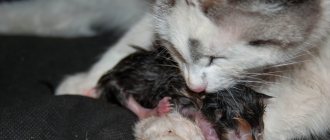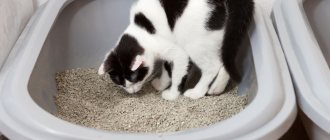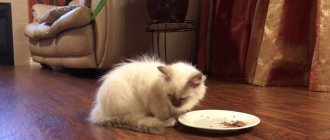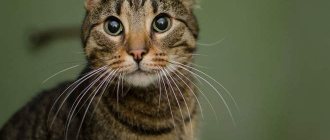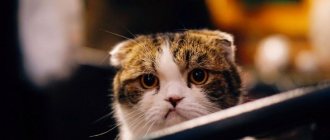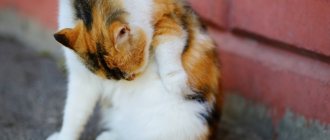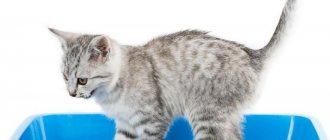How can you tell if your kitten is constipated?
Constipation can be expressed not only in the absence of stool. This factor can be missed if the pet has access to the street and defecates there. What are the signs that indicate that a kitten is constipated?
- Frequent but unproductive attempts to go to the toilet.
- The kitten meows when it tries to empty its intestines, walks around the tray for a long time and is afraid of it.
- Dry, hard, small stools.
- Mucus or blood in the stool.
- Lack of appetite.
- The kitten does not lick itself, is lethargic, has lost weight.
- A small amount of liquid feces after the kitten has been pushing for a long time.
What is constipation?
From birth to three weeks, babies are fully cared for by their mother. The cat licks each baby not only to clean and remove foreign odors from the fur. It is with her tongue that she stimulates the emptying of the bladder and intestines of babies. Without such a massage, newborn kittens cannot go to the toilet.
At the age of 4–5 weeks, the formation of the intestine and its microflora ends. From this point on, kittens can begin to try adult food, but the bulk of the diet is still mother's milk. Their stools begin to change, babies walk 4-6 times a day. The more kittens feed on their own, the more formed the feces become. As they grow older, defecation occurs less frequently, but the owner should detect feces in the litter box every day.
If your baby does not defecate for a long time, it means he is constipated. Feces accumulate, forming a plug in the intestines. As a result of constipation, the pet's general condition gradually worsens due to intoxication of the body.
Causes of intestinal problems
A kitten in the house requires attention, especially a small one. At a young age, animals often have digestive problems, in which the kitten does not go to the toilet in a big way. It is very important to ensure that he has regular bowel movements.
What are the reasons that a kitten does not go to the toilet in a big way?
- Newborn kittens need help to defecate.
- The second factor that can affect stool is poor diet.
- The third common reason why a kitten becomes constipated is stress associated with a change of residence and separation from its mother.
- The fourth reason for poor bowel function is a possible disease.
Disease
In some cases, even very young kittens can be severely infected with helminths - the animal’s intestines are literally clogged with worms. Typically, such kittens have a large, swollen belly. Older kittens may swallow foreign objects during play (for example, threads or New Year's rain), which can also cause a lack of bowel movements due to intestinal obstruction. Usually this condition is accompanied by a general deterioration in health, refusal to feed, and vomiting.
Subscribe to our newsletter and get a free veterinary consultation
Thanks for subscribing!
Help for newborn kittens
Young kittens often have problems with bowel movements. The fact is that kids need outside help. A cat should lick her babies not only to clean their fur. A gentle massage stimulates the intestines and ensures blood flow. Licking helps the kitten get rid of the contents of the intestines, because he cannot do this on his own.
In the case when a young and inexperienced mother refuses to care for her offspring, a person must help. Help may also be required if the adopted kitten is one month old or less.
In order to perform a massage, you need to take a small piece of soft cloth or cotton wool and moisten it with warm water. Now make short longitudinal movements from chest to tail across the entire tummy. Movements should be very soft, gentle, not causing discomfort to the kitten. There is no need to press on the tummy, just stroke it.
Possible reasons for lack of stool
The absence of stool in a kitten for 1-3 days should not cause panic in the owner if the animal’s behavior is otherwise normal.
But it’s worth palpating the abdomen and monitoring what and how the kitten eats.
Small kittens most often suffer from problems with bowel movements (constipation)
The main reasons for the absence of bowel movements in a small kitten:
- Changing the diet and replacing familiar food with a new one , especially if the kitten has just been weaned from the cat. A problem may also arise in a kitten that was picked up from the street: lack of food, consumption of various wastes and a sudden transition to homemade food can cause constipation.
- Unbalanced food with an abundance of meat and fish products or not enough water for the animal to drink. A small body is just beginning to get used to a new diet, so the introduction of new foods should be gradual.
- Worm infestation , most often in kittens picked up from the street. Due to the growth of a ball of worms, the kitten stops pooping.
- Adaptation and stress after moving to new owners can affect the lack of appetite and bowel movements.
- Hairballs that form due to licking can block the path in the intestines for the release of feces, so the kitten must be given a special paste that dissolves the hair.
- Diseases of the gastrointestinal tract, intestinal obstruction, chemostasis, coprostasis.
- Dry concentrated food.
- Large amount of food eaten.
- Foreign bodies entering the stomach, intestines - beads, paper, bones.
- Sedentary lifestyle.
If the kitten has not pooped for more than 3 days, the belly is swollen, and touching it causes pain in the baby, you should immediately consult a veterinarian.
Feces will begin to release toxic substances that will disrupt the functioning of the kidneys and liver, which can lead to death.
Be sure to read:
Diarrhea in a cat: treatment at home, causes and symptoms, medications, diet
Stress
One common reason why a kitten won't go to the toilet is stress. First of all, it is caused by moving to a new home, a change in familiar surroundings, and separation from the mother. Another reason could be fear. A kitten may become frightened by another aggressive animal or by harassment from a child.
Due to stress, the baby may refuse to go to the toilet for up to 5 days. There is no need to worry if, immediately after acquisition, the kitten does not go to the toilet regularly for several days. Provide the animal with a calm environment, do not disturb it and let it get comfortable. It is very important to surround the baby with affection, as he yearns for his mother.
If there is a child in the house, then explain to him that he cannot play with the kitten right away. He is easily frightened by sharp sounds and movements. A healthy animal will get used to it very quickly. In just a few hours, the baby will begin to explore the new home, find a bowl and tray, and want to play.
Litter tray is not suitable for kitten
As you know, cats hide what they did after going to the toilet. However, if they don't like the filler, they can walk away from the tray. When a kitten has just been purchased, you need to check with the seller what kind of litter the animal is accustomed to. Some breeders use trays with bars, without filler. Others use silica gel, bentonite clay or sawdust. There are fillers with a strong aroma, which can also scare away the kitten. For cats, everything is individual. Only attention, patience and love will help the owner choose the best option for the pet.
Nutrition
Another cause of intestinal dysfunction is poor nutrition. The animal's body needs time to get used to new food. It is especially important not to change the feeding pattern during the kitten’s adaptation after moving to a new home. To do this, you need to find out from the previous owners how they feed the kitten, what its favorite food is. It is best to take some food from the previous home and feed it to your pet for the first few days. You can purchase food of the same brand.
New foods should be introduced gradually. The kitten can be fed dry or wet kitten food or natural food. If the diet includes dry food, you need to ensure that the animal always has access to clean water. When feeding natural food, to improve intestinal function, bran should be added to the food. This measure will help prevent constipation.
Cats are carnivores and their natural food is meat. The kitten begins to gradually become accustomed to animal products from the age of 1.5 months. This needs to be done gradually. The meat should be cut into small pieces and boiled without salt and spices for 10-15 minutes, cool. You can grind it to a puree. It is good to use baby puree in jars as a meat supplement for kittens.
Constipation can occur due to lack of fluid. Make sure your pet drinks enough, especially if he eats dry food.
What's normal and what's not?
If you have never had a cat in your apartment before, you need to know why kittens vocalize most often:
weaned from their mother, they experience stress; animals want to eat, but don’t know where the food is; ready to play, so they do their best to attract attention.
Knowing about these cat habits, it is easy to project them onto the toilet situation. In the new walls, without a mother who took care of everything, including the hygiene of her baby, the kitten is lost. Even if he was already litter box trained, everything was different in the old house! Well, how can you not start meowing all over the apartment!
The owner is faced with a rather tricky task - to help the pet “remember everything” and convince him that the new tray is no worse than the old one. The situation is more difficult when the kitten has not yet acquired the necessary skills.
Its owner has to start training from scratch: watch with sympathy as the baby walks around the rooms and cries, clearly worried about where to relieve himself, and in the toilet, where he is dragged, cannot figure out that it is the tray that will give the long-awaited relief, and squeaks even more pitifully. However, no matter how difficult the lessons turn out to be, this is a normal process and there is no reason to worry.
Another fairly typical cause of concern may be the desire of the mustachioed-striped one to certainly attract the attention of his owners: he wants someone reliable to be nearby, if necessary, to help, to protect him from “external enemies” who strive to “offend the weak” in situations when he is particularly defenseless and not ready to escape. However, this is a purely individual question.
Some kittens will prefer an intimate setting for toileting, while others will want to remain the center of attention. There are many cases when respectable cats, accustomed to independence from youth, having matured, begin to attract the attention of people in precisely this way (in the absence of any physiological problems).
However, this is a purely individual question. Some kittens will prefer an intimate environment for toileting, others will want to remain the center of attention.
There are many cases when respectable cats, accustomed to independence from youth, having matured, begin to attract the attention of people in precisely this way (in the absence of any physiological problems).
However, in order to be sure that your pet’s health is all right, you need to know some of the characteristics of the cat’s body and notice any deviation from the norm. Here are a couple of important points:
- if plant foods occupy a significant place in the diet, then the kitten often does “big things” than if it was fed mainly protein foods;
- Kittens walk “small” more often than older animals, since their bladder is very small.
The point, of course, is not to record on paper every visit of your pet to the toilet, but if you realize that he hasn’t been there for a long time, perhaps you will prevent the development of any gastrointestinal diseases in your baby and find a way to help to him.
What to do if the kitten does not go to the toilet in a big way?
So, your kitten is used to his new home, happy and active, but still does not go to the toilet? Certain measures need to be taken. If the animal does not go to the toilet for more than five days, you need to carefully palpate its abdomen. The fact is that constipation is most often accompanied by bloating, as well as pain during bowel movements.
How to tell if a kitten is in pain? In this case, he walks around the tray for a long time, adjusts himself, and squeaks pitifully. Sometimes stool may be visible in the anus. In difficult cases, a veterinarian will help. Calling such a specialist to your home is not a problem, but you can try to deal with the problem yourself.
Why doesn't the kitten poop and what to do in such a situation?
Let's analyze this situation in more detail, because... she's pretty typical.
At first, the kitten was given the wrong complementary foods. The breeder fed the kittens directly with factory food, and not raw meat - this is wrong. This is wrong even in cases where the animal is subsequently planned to be kept on dry food. It is raw meat that improves the functioning of the digestive system and leads to the production of the correct enzymes. Even breeders who are fans of drying admit this fact. Those. The first reason is that the cat’s digestion was not started correctly.
Then, once in a new home, the cat ate the wrong natural food, plus they changed the type of food too quickly: many products were introduced at once, although 1 product is needed every 1-2 days, and at first it should be only meat, everything else is introduced only when The cat is used to meat. Those. digestion was initially not properly established at the breeder's, and in the new home he was confused by new and not entirely correct products. Most likely, at the moment there is some enzyme deficiency. It can be corrected with special medications, but for now you can try to fix everything without their help. The process usually takes 2-3 weeks.
On the factory feed, I had stool twice a day due to the fact that the feed forms frequent and bulky stools, because... contain too much fiber that cats don’t need (mostly it comes from cereals). As a result, ballast quickly passes through the intestines and forms bulky feces, which is not typical for cats as a biological species. Cats on a natural diet walk less often, as befits a predator in nature: it leaves behind few traces so that larger predators and potential prey do not detect it.
On a natural basis, because almost all meat food is digested, almost nothing comes out. The stool becomes harder and darker. In natural conditions, cats go to the toilet from 1-2 times a day to 1 time in 3 days - this is the norm. But there are cats prone to constipation: these go to the toilet less often for many years and feel fine. However, we consider an interval of more than 3 days to be too long, so first we should try to adjust it to once every 1-3 days.
Another reason why a kitten rarely poops is a lack of fiber. Judging by the fact that according to the Bristol stool scale, the stool of the cat described by our reader is normal (she does not strain, there is no blood in the stool and other signs), then she does not have constipation as such. Accordingly, it can be assumed that the reason lies in an insufficient amount of fiber. The cat simply has no reason to go to the toilet, because... Almost all meat food is digestible.
For cats that are not prone to constipation, fiber can be given in minimal quantities. If the cat is prone to constipation, then it is advisable to increase the amount of fiber in the food. Which is what the reader did by giving her wheat porridge. The result is already in the tray. But if you adjust your diet, it will be perfect. Therefore, instead of cereals that are harmful to cats (wheat porridge is especially harmful), it is better to give vegetables - pumpkin, zucchini, carrots, beets (but be careful with them, as they can cause diarrhea). They are the basis for the formation of feces, containing a lot of fiber, and also provoke better intestinal motility. Flaxseed meal also enhances peristalsis.
Vegetables and meal can be added to meat before freezing. It is better to grate vegetables. Having frozen together with the meat, the meal and vegetables will be saturated with meat juice - and the cat will eat them without problems.
Thus, for the next 2 weeks, while the stool is being adjusted, you need to feed in the ratio: 90-95% meat and 5-10% vegetables with a pinch of meal. All meat is only raw, frozen, because... Boiled can also cause constipation and contains almost no nutrients.
Also, the formation of feces occurs with the help of the meat and bone component, which is also a source of calcium. Read here in more detail about how to introduce it into your diet and whether it’s worth doing it at all. But for the first 2-3 weeks of a raw food diet, the kitten cannot eat bones in any case, but calcium is nevertheless needed. It can be taken from cottage cheese, eggshells and additives.
The liver is given raw, like meat, but is added to the diet not as a separate meal, but together with other types of meat - up to 5% of the portion. Raw liver is very weakening, so for this purpose it can be added to food every day (but still no more than 5% of the diet). The spleen is also an excellent weakening agent: it can be periodically added instead of the liver in the same proportions. If the cat becomes very relaxed after this, the proportion of the liver and spleen should be reduced.
The number of feedings at this age can already be reduced and food should not be available around the clock. Natural nutrition is not drying, it is dosed.
The body's adjustment to a new type of diet usually occurs within 2 weeks. It is worth observing which foods produce results in the tray and adjusting your diet accordingly. If after 2-3 weeks adjusting the diet does not help and stool is still rare, you can add enzymes for cats. Perhaps the reason is enzyme deficiency: then for some time the cat will need support in the form of enzymes in supplements.
Oil
This remedy works well for both adult animals and kittens. If he does not go to the toilet for several days, vegetable oil will help relieve the condition. You don’t need to give a lot of oil, half a teaspoon per day is enough. It is most convenient to give the product from a syringe without a needle. The oil must be poured in very slowly so that the kitten does not choke. Now going to the toilet will not bring discomfort. After consuming the oil, the animal may be thirsty.
You can also simply mix a little vegetable oil into your food. Do not overuse this method, as it has a negative effect on the liver. The kitten should go to the toilet due to proper nutrition, and not due to the constant addition of vegetable fats.
You made a mistake during the learning process
You cannot force a kitten to go into the litter box. Any methods of punishing a kitten will be ineffective if the animal that has gone the wrong way is spanked, scolded, or poked with its muzzle into a puddle or pile. The innate quality of a cat is the desire to relieve itself in the same secluded place. Therefore, the process of training a kitten requires observation and a lot of patience. Harsh methods of coercion and punishment are unacceptable.
If the owner does this, the pet will choose a time, a place, hide and take revenge. Expert recommendations boil down to the fact that you should be especially attentive to the kitten after feeding, since the animal tends to go to the toilet after eating. At this time, you need to show him where the tray is located. Under no circumstances should you force him to sit in the tray, press on the sacrum, or dig for litter. With a patient, non-aggressive attitude, the kitten will definitely understand what is required of it.
Enema
If constipation has been going on for several days, you can resort to an enema. The procedure must be performed extremely carefully. To do this, take lukewarm boiled water and a 10 mg syringe. It is more convenient to do an enema together. One person gently holds the kitten while another person gently and slowly introduces the liquid.
The syringe must be inserted so that the liquid does not spill out, deep enough. The tip can be lubricated with oil or Vaseline. You need to feel the kitten's tummy to understand when the intestines are full. There is no need to press hard on the stomach, light touches are enough. If necessary, the procedure can be performed several times.
Enema to a kitten should be done very carefully, especially if you do not have the necessary experience. It is best to have the procedure performed by a veterinarian. It’s easy to call him at home. You can visit the veterinary clinic yourself.
What do we have to do?
If the kitten does not poop even for two days, action must be taken. The course of action largely depends on the cause of constipation.
- A massage will help a little kitten . The baby is placed on his back. After moistening a soft cloth or cotton pad with warm water, make longitudinal movements along the tummy from the chest to the tail. You must act carefully, gently, without pressure. The kitten should not experience discomfort. The duration of the massage is 2-3 minutes.
Massage
- A few drops of oil added to food twice a day will help relieve constipation. Olive, linseed, and Vaseline oil are suitable, but it is better to avoid sunflower oil, as it puts a powerful strain on the liver. You can use a syringe without a needle and drop the oil directly into your mouth. The daily dose is no more than half a teaspoon.
- Soap can help a kitten solve the problem of going to the toilet . A small piece is cut into a candle shape, then moistened with water and inserted into the animal’s anus. The procedure is unpleasant for the baby, so it is better to carry it out when he is sleeping. After a short time, the soap will begin to act, and the kitten will go away.
- After several days of constipation, it is acceptable to use an enema . The procedure will require a small syringe (10 ml). It is filled with lukewarm boiled water. The tip is lubricated with Vaseline or oil and carefully inserted into the animal’s anus. The insertion depth should be sufficient to prevent the liquid from spilling out. Carrying out manipulations alone is very inconvenient, given that the kitten is unlikely to lie still. You will need an assistant. But if you don’t have enough experience, it’s better to invite a veterinarian.
- Medicines for constipation must be prescribed by a doctor. It is not recommended to use them yourself. There is a whole group of medications suitable specifically for small kittens. These include, for example, “Lactusan” and “Duphalac”. These are mild products based on lactulose, a substance that causes a laxative effect.
You should not self-medicate. If the kitten does not walk at all for several days, it is time to contact a specialist.
Treatment of kittens for constipation with medications
It is better not to start medicinal treatment of a kitten without a doctor’s prescription. You need to choose the right remedy and dosage so as not to cause diarrhea and other negative consequences. Vaseline oil can be used to gently treat constipation.
Vaseline oil can be easily purchased at a regular pharmacy (not to be confused with petroleum jelly). It should be given 2-3 times a day in small quantities - 1.5 mg per kilogram of weight. Keep in mind that the weight of a kitten can be significantly less than a kilogram. The oil gently coats the intestinal walls, but is not absorbed.
Castor oil cannot be used to treat kittens. The result will not be achieved, and due to the action of the drug, the animals will experience pain.
Mild preparations based on lactulose are used to treat constipation in kittens. For example, “Laktustan”, “Lizalak”, “Dufalak”. These products have the safest effect. It is not recommended to use a stronger laxative for kittens without consulting a veterinarian.
Duphalac is given to the kitten 2 times a day, 0.5 ml per kilogram of weight. The effect of the drug is similar to the effect of Vaseline oil, so there is no need to use both products at the same time.
Kitten is stressed
Many cats react very nervously to any changes. They do not like moving, changing furniture, or repairs. They have a hard time with the arrival of new people in the house. For pets, having a baby can be stressful. In this case, you shouldn’t be surprised when puddles appear in unexpected places throughout the house. This only means that the kitten is stressed, he is marking his territory and defending himself. He should not be punished for this, but it is better to show him to the vet so that he can prescribe sedatives. This will help the cat recover and adapt to new living conditions.
Source
Some funny cats
The development of the disease is promoted by:
- genetic predisposition of the breed;
- dehydration;
- sedentary lifestyle;
- unbalanced diet;
- increased levels of calcium in the blood.
When urine obstruction begins, animals begin to urinate frequently in small portions. When complete abstruation occurs, the urethra is blocked, the kitten cannot go to the toilet.
Urolithiasis often develops simultaneously with cystitis, because sand and stones injure the mucous membrane of the ducts, causing an inflammatory process.
Need to know ! The following should be excluded from the diet of animals with a predisposition to urolithiasis:
- fish - phosphorus promotes the formation of stones;
- raw meat thickens and urine is more difficult to excrete;
- milk – contains magnesium, which prevents the flow of urine.
Animals are fed food with a high content of vitamins A, B, and glutamic acid.
Reason 2. Anuria
In kidney failure, organs lose their ability to produce urine. The acid-base metabolism and water-acid balance of the body are disrupted, which leads to intoxication.
Tray requirements
The kitten doesn’t want to go to the litter box and why does it go to other corners? This is a question many cat lovers ask. There may be a problem with the tray itself.
Recommendations:
- the cat litter box should be conveniently located;
- there should be peace and quiet in the toilet;
- you should select a tray so that the kitten can easily enter it or the sides should have a height corresponding to the kitten’s height;
- dryness and warmth are the best friends of any cat, so daily cleaning should be done;
- Some kittens like litter boxes made in the shape of a house, and some don’t like confined spaces, so it’s worth experimenting here;
- The baby should also like the smell.
© shutterstock
You can’t scold or beat your pet because he missed or walks incorrectly; cats are frightened by swearing and screaming, and next time they will simply be confused and will not know what to do. After the first week of your furry friend’s stay with the new owners, you can understand what he likes and what needs to be corrected so that the cat is happy with everything. To do this, you need to monitor your pet's behavior on a daily basis.
